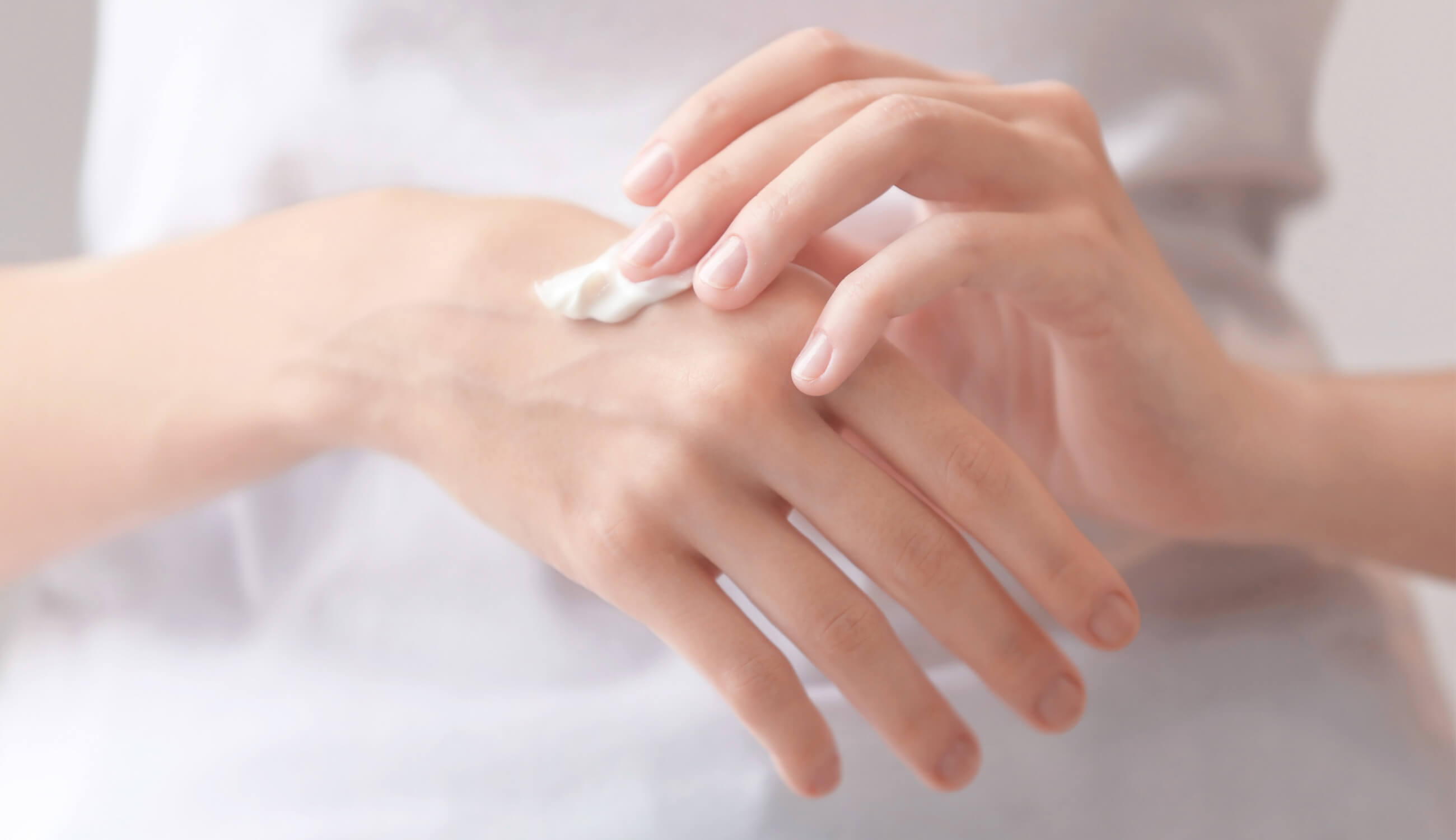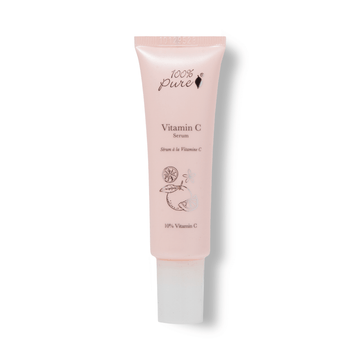Are these mistakes making your sensitive skin worse?
Posted on August 9, 2025 Written by: 100% PURE ®
If you have sensitive skin, you’re well versed in the many emotional and environmental factors that can affect this temperamental skin type.
Maybe you tried a new cleanser, maybe the wind simply changed direction – and now your skin is red and inflamed. But can anything and everything really be a trigger for sensitive skin? We’ll go over what sensitive skin means, and the key things not to do if you have this vulnerable skin type.
About 70% of people in the U.S. consider themselves to have sensitive skin. In a skin care realm saturated with “sensitive skin” labeled products, it’s easy to fall victim to marketing ploys that promise safety for your skin. But with a few type-testing criteria, you’ll be well on your way to knowing if you have skin sensitivity.
Maybe it’s in your genes
You could be genetically predisposed to the skin type. Genetically, sensitive skin is considered more delicate because it has less pigmentation, a thin epidermis, and blood vessels close to the skin’s surface; hence the appearance of redness and irritation.
With a less protective epidermis, skin irritants and topical products can easily penetrate and cause reactions such as blisters and flushing. Though sensitive skin can be passed down through generations, there are still ways to manage its effects.
Maybe it’s in your environment
You could be environmentally exposed to the skin type. This means the protective layer of your skin has been compromised by something other than genetic factors. This “sensitized” skin can be brought on by external factors such as pollution, stress, alcohol, cosmetic ingredients, diet, and climate changes.
With sensitized skin, environmental triggers can cause inflammation, tingling, itching, and thickening or dryness of the skin. While some of the environmental factors are difficult to avoid, others can be managed through natural skin care and lifestyle changes.
Follow these tips to help protect your sensitive skin against environmental triggers and enjoy healthy, beautiful skin every day.
If your skin is constantly experiencing adverse reactions to certain ingredients, that may cue you off to having sensitive skin. Have you ever tried a few too many makeup, body care, or perfume testers at the mall? After perusing around for a little while, did you start to feel itching, burning, or irritation on your skin? That could be a sign that you’ve overwhelmed or sensitized your skin.
You may also have bad skin reactions to products if you have a pre-existing condition like eczema, rosacea, or psoriasis. For more delicate or fairer skin types, something as simple as applying gentle pressure to your skin will trigger sudden redness.

Having sensitive skin can feel like wandering through a minefield. From hereditary factors to environmental triggers, it can be overwhelming trying to figure out what’s causing your bad skin reaction. Get to know these sensitive-skin no-no’s, to avoid possible triggers and maintain clear, healthy skin.
#1: Trying products without patch testing
Put your hand up if you run home after purchasing a new skin care product, and slather it on your face? As enticing as this is, refrain from diving in headfirst. If you suspect having sensitive skin or are trying out products for the first time, consider patch testing first. Patch testing may identify signs of an allergy, such as redness or irritation.
Patch testing will ultimately tell you if a product is safe for you, and you’ll save money by returning a product that you can’t use. Consider using the side of your neck to test since the skin is thinner there and generally more reactive. To be more discreet, test behind your ear. Then wait 24 hours so you can look for signs of redness or irritation. If your neck or ear area can tolerate it, chances are your face can, too.
PRO TIP: When patch testing, always use the product as directed. For example, don’t leave a cleanser on your skin without rinsing it off; this can cause undue reactions since cleansers are meant to be rinsed away.
#2: Continuing to use products that trigger reactions
We’re all too familiar with loving things that aren’t good for us. It’s not easy to stroll down that aisle of desserts without salivating like Pavlov’s dog. If you have sensitive skin, falling in love with a skin care product – even if the love isn’t reciprocated – is an absolute no-no.
If you have sensitive skin and are continuing to use a product that’s causing reactions, it’s time to break up. The same goes for the convenience factor of holding on, instead of dealing with the tedious return process. Get that money back, and make room on your shelf for something that deserves your love!
#3: Buying products with sensitizing ingredients
With skin that’s as temperamental and delicate as sensitive skin, you want to be mindful of what you’re putting on it. Many conventional skin care and beauty products contain harmful ingredients that are not only bad for sensitive skin, they can further exasperate your reactivity.
The next time you’re shopping for skin care, it’s important to read ingredient lists: opt for nutrients, not toxins. Avoid chemically laden products, harsh dyes and fragrances, sulfates, detergents, and alcohols. Get to know which ingredients are good for you, and make a list of the ones that tend to trigger adverse reactions.
#4: Using photosensitive ingredients during the day
Yes: that skin-loving, brightening superstar vitamin C can be a photosensitive trigger for sensitive skin! That means it makes skin sensitive, and therefore more vulnerable, to the effects of sunlight. If you have skin sensitivities, wearing vitamin C during the day can make you more susceptible to redness, irritation, and inflammation. Retinol, alpha hydroxy acids, and hydroquinone are other daytime no-no’s.
With sensitive skin, you’ll want to save vitamin C or other photosensitive ingredients for nighttime use. For very sensitive skin, even a broad spectrum sunscreen can’t stop photosensitive reactions from wearing ingredients like vitamin C or citrus.
#5: Skipping sunscreen
If you have sensitive skin, you’ll know this catch-22: sunlight irritates your skin, but many sunblocks can trigger reactions. While we understand the seemingly no win-win situation, it’s highly important to not skip wearing a daily sunscreen.
Sensitive skin is particularly more susceptible to sun damage because it has a weaker structure and is less resilient to external aggressors like the sun. If you’re experiencing a reaction from sunscreen, it’s likely due to active chemicals like oxybenzone, avobenzone, or octinoxate. Mineral oils and fragrances in sunscreens are also common culprits for adverse reactions. Stick with mineral options like zinc oxide, and apply daily!

#6: Washing too often or too hard
Sensitive skin types need a little extra TLC when it comes to cleansing. Washing sensitive skin is a delicate balance between hygiene and protective barrier damage. While you’ll want to be mindful to use a gentle natural cleanser, you’ll also want to be careful to not strip your skin.
If you have sensitive skin, refrain from over-washing your face or scrubbing too hard with any type of skin care product. Scrubbing will not only disrupt your skin’s lipid barrier, it will aggravate inflammation and trigger redness.
Finding ways to avoid potential triggers and soothe irritated skin will help keep your skin calm, strong, and healthy. If you’re interested in learning more about great products for sensitive skin, be sure to keep up with our skin care blog!
Soothing Solutions: Products to Support & Strengthen Sensitive Skin
While avoiding bad habits is key, pairing your skincare routine with calming, barrier-repairing formulas can help your skin stay resilient through everyday stressors. Here are three ultra-gentle, sensitive-skin-safe 100% PURE products formulated to reduce inflammation, soothe irritation, and protect your skin’s delicate moisture barrier:
1. Calendula Flower Cleansing Milk
Made with soothing calendula, chamomile, and rose hydrosol, this creamy cleanser gently removes impurities without stripping the skin. It’s ideal for sensitive skin types prone to redness or dryness, offering both hydration and calm in every cleanse.
Why it’s great: Fragrance-free, ultra-mild, and packed with skin-soothing botanicals that reduce inflammation.
2. Restorative Sea Culture Replenishing Serum
This serum harnesses the power of mineral-rich sea kelp and green algae to rebuild and fortify the skin barrier. Lightweight but deeply hydrating, it restores calm to sensitized skin while supporting long-term healing.
Why it’s great: Targets inflammation and barrier repair without the risk of stinging or reactivity.
3. Hydra Drench Cream
This lightweight, ultra-hydrating cream is infused with omega-rich chia seed gel and sodium PCA, which mimic the skin’s own natural moisturizing factors. It offers deep hydration without heaviness, making it ideal for sensitive or combination skin.
Why it’s great: Absorbs quickly, reduces redness, and supports long-term moisture balance—without clogging pores or irritating delicate skin.
FAQ: Sensitive Skin Questions—Answered
1. What ingredients should I avoid if I have sensitive skin?
Sensitive skin types should avoid synthetic fragrances, alcohols, sulfates (like SLS), parabens, and harsh exfoliants. Ingredients like oxybenzone (in sunscreen), menthol, and certain essential oils (e.g., peppermint, citrus) can also be irritating. Instead, opt for fragrance-free or naturally scented products made with soothing ingredients like calendula, chamomile, oat, and aloe.
2. Can I exfoliate if I have sensitive skin?
Yes—but gently and sparingly. Choose enzyme-based or mild lactic acid exfoliants over gritty scrubs, and limit exfoliation to once a week. Always follow with a calming serum or moisturizer, like the Restorative Sea Culture Replenishing Serum, to soothe the skin barrier after exfoliation.
3. Why does my skin react to almost every product?
You may have a compromised skin barrier or be experiencing contact dermatitis triggered by common allergens like fragrance or preservatives. Look for products with a short ingredient list, free from known irritants, and consider patch testing everything. Chronic reactivity may also be linked to underlying skin conditions like eczema or rosacea—speak to a dermatologist for confirmation.
4. Can diet affect sensitive skin?
Absolutely. High-sugar, high-dairy, or highly processed diets can contribute to systemic inflammation, which shows up as flare-ups in sensitive skin. Anti-inflammatory foods like berries, leafy greens, turmeric, fatty fish, and chia seeds may help reduce redness and support overall skin health.
5. Is sunscreen safe for sensitive skin?
Yes, but choose your formula wisely. Avoid chemical sunscreens with active ingredients like oxybenzone or avobenzone, which are more likely to cause irritation. Instead, choose a physical (mineral) sunscreen with zinc oxide or titanium dioxide. Always patch test new SPF and look for formulas that are fragrance-free and designed for sensitive skin.
- Tags: August-2025, Skin Care, skincare
We carefully hand-select products based on strict purity standards, and only recommend products we feel meet this criteria. 100% PURE™ may earn a small commission for products purchased through affiliate links.
The information in this article is for educational use, and not intended to substitute professional medical advice, diagnosis, or treatment and should not be used as such.


















